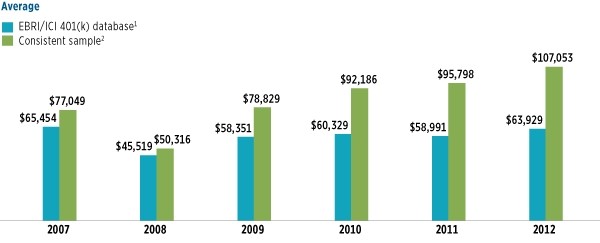News Release
Accounts of Consistent 401(k) Participants Grew 6.8 Percent Annually During the Five Years That Included Financial Crisis
Study Confirms Expanding Role of Target Date Funds in 401(k) Plans
Washington, DC, July 31, 2014—The average account balance of workers who participated consistently in a 401(k) plan from year-end 2007 to year-end 2012 increased at a compound average annual growth rate of 6.8 percent during that period, despite a 34.7 percent drop in that group’s average 401(k) account balance in 2008, according to a new study by the Employee Benefit Research Institute (EBRI) and the Investment Company Institute (ICI) released today. The increase in account balances reflects several factors, including employer and worker contributions, investment returns, withdrawals, and loans.
The study, “What Does Consistent Participation in 401(k) Plans Generate? Changes in 401(k) Account Balances, 2007–2012,” also found that at year-end 2012, the average account balance of the consistent participants was 67 percent higher than the average account balance among all participants in the EBRI/ICI 401(k) database. Further, the consistent group’s median balance increased at a compound annual average growth rate of 11.9 percent over the period, to $49,814 at year-end 2012—almost three times the median balance across all participants at year-end 2012.
Consistent Group Permits Meaningful Analysis of Potential for Accumulation of Assets
The new study looked at the accounts of about 7.5 million consistent participants among the 24.0 million participant accounts in the EBRI/ICI 401(k) database, over the five-year period from year-end 2007 to year-end 2012. While the separate, annual update report on the EBRI/ICI 401(k) database is based on large cross sections of 401(k) plan participants with a wide range of tenure and participation experience, a more meaningful analysis of the potential for 401(k) participants to accumulate retirement assets over time is possible by focusing on accounts that remain in the database for an extended period.
Average Account Balance for EBRI/ICI 401(k) Data:
Consistent Participants Versus Cross-Sectional Sample

1 The year-end 2012 EBRI/ICI 401(k) database represents 24.0 million 401(k) plan participants.
2 Participants include the 7.5 million 401(k) plan participants with account balances at the end of each year from 2007 through 2012.
Note: Account balances are participant account balances held in 401(k) plans at the participants’ current employers and are net of plan loans. Retirement savings held in plans at previous employers or rolled over into IRAs are not included.
Source: Tabulations from EBRI/ICI Participant-Directed Retirement Plan Data Collection Project
“This research provides a meaningful analysis of the potential for 401(k) participants to accumulate retirement assets because it examines how a consistent group of participants’ 401(k) accounts change over time,” said Sarah Holden, ICI’s senior director of retirement and investor research and coauthor of the study. “The research highlights that contributing and investing in a 401(k) plan consistently results in higher average account balances than the average balance for all plan participants.”
Number of Consistent 401(k) Plan Participants Holding Target Date Funds Grew
More consistent 401(k) plan participants held target date funds at year-end 2012 than at year-end 2007, the study revealed.
“The data confirm the continuing important role of target date funds in 401(k) plans, revealing that a substantial core of consistent 401(k) participants who held at least some target date fund assets in their account before the financial crisis, still did so at year-end 2012,” said Jack VanDerhei, EBRI research director and coauthor of the study. “At year-end 2012, nearly one-third of those holding any target date fund assets invested all of their 401(k) balances in target date funds.”
At year-end 2007, 27.6 percent of consistent 401(k) plan participants held at least some target date fund assets in their 401(k) accounts, though by year-end 2012, that share had risen to 32.1 percent. More than two in five (43.7 percent) consistent 401(k) participants in their twenties had target date funds in their 401(k) accounts at year-end 2012, compared with 28.4 percent of consistent 401(k) participants in their sixties.
Consistent 401(k) Participants Tend to Concentrate Their Accounts in Equity Securities
Asset allocation by the 7.5 million 401(k) participants in the consistent group was broadly similar to that of the 24.0 million participants in the entire year-end 2012 EBRI/ICI 401(k) database, with both sets showing a tendency to concentrate their accounts in equity securities. On average, about three-fifths of 401(k) participants’ assets were invested in equities, either through equity funds, the equity portion of target date funds, the equity portion of non–target date balanced funds, or company stock. Younger 401(k) participants tend to have higher concentrations in equities than older 401(k) participants.
The Employee Benefit Research Institute is a private, nonpartisan, nonprofit research institute based in Washington, DC, that focuses on health, savings, retirement, and economic security issues. EBRI does not lobby and does not take policy positions. www.ebri.org.
The Investment Company Institute is the national association of U.S. investment companies, including mutual funds, closed-end funds, exchange-traded funds (ETFs), and unit investment trusts (UITs). ICI seeks to encourage adherence to high ethical standards, promote public understanding, and otherwise advance the interests of funds, their shareholders, directors, and advisers. Members of ICI manage total assets of $17.1 trillion and serve more than 90 million shareholders.
